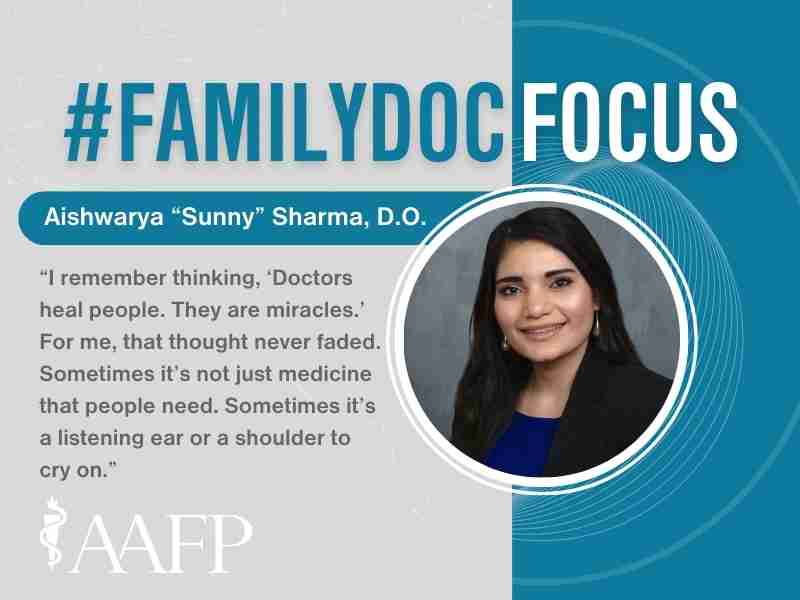Resident Eager to Give Back to Underserved Communities
September 15, 2022, 11:15 a.m. David Mitchell — Aishwarya “Sunny” Sharma, D.O., was just 19 when she graduated as valedictorian from Lake Erie College. To save money for medical school, she went to work as an emergency room medical scribe, tutored high school and college students, and worked in customer service for a company that manufactured things like bearings and couplings.

“I was working two full-time jobs,” said Sharma, a third-year family medicine resident at MetroHealth Medical Center/Case Western Reserve University in Cleveland. “One-hundred-hour work weeks were normal. I figured residency would be similar, so I was prepared.”
Spending more than two years in an emergency room setting helped lead Sharma to a career in primary care.
“I saw a recurrence of the same types of patients with conditions primary care could have resolved,” Sharma said. “The patients with high utilization made me ask, ‘Where are the family docs?’ Then a patient told me there was a six-month wait to get in with her primary care physician. She said, ‘I missed one appointment, and now I can’t get refills because I haven’t been seen in a year. That’s why I come here.’ Clearly, there was a need for more primary care physicians.”
Sharma tried to keep an open mind about specialty choice during her rotations, but her path never wavered.
“Family medicine is the one for me,” she said. “I wanted to see all ages. I wanted to see all the different disease processes and be a partner for patients. Although it is true that every health care specialty involves partnerships, the connection that forms in family medicine is unparalleled. We see the kids, their parents and grandparents. It’s a privilege to have that relationship.”
Sharma’s interest in health care started early, as did her desire to help those most in need. She was 5 when one of her father’s violent rampages sent her mother and older sister to a hospital in Jodhpur, India, with serious injuries. The facility was small, underfunded and overcrowded, but Sharma witnessed a female physician tend to her mother’s and sister’s injuries while also treating them with incredible kindness and empathy.
That moment, Sharma said, ignited her desire for a career in medicine.
“I remember thinking, ‘Doctors heal people. They are miracles,’” she said. “For me, that thought never faded. Sometimes it’s not just medicine that people need. Sometimes it’s a listening ear or a shoulder to cry on.”
Two years later, Sharma, her mother and sister left India behind and started over in the United States. Her mother, who had been a lecturer and school principal in India, became a college professor, eventually settling in Ohio.
“My mom experienced grotesque violence,” she said. “She knew no one here. She built our lives from the ground up.”
It wasn’t easy. The family arrived in their new country with little money and no insurance. Sharma recalled being treated at home for severe illnesses as a child.
“I know what it’s like,” she said. “I grew up with that. It’s really important to me to be able to give back to an underserved community. There’s such a massive need. There’s a lot of work to be done.”
Sharma will complete residency in June and will practice in a yet-to-be-determined underserved community as a participant in the National Health Service Corps Student to Service program. Her scholarship, combined with the money she saved during those 100-hour work weeks between college and medical school, will allow her to finish her training without any student debt.
She knows many people are less fortunate than her and she hopes to be an advocate in her new community. Sharma already has taken on numerous leadership roles, having served as president of the Student Osteopathic Medical Association and fundraising coordinator of the Student National Medical Association, in addition to numerous committees and work groups for the ABFM, the American College of Osteopathic Family Physicians, the American Osteopathic Association and the Ohio State Medical Association.
Sharma interned in the office of Sen. Sherrod Brown while she was a junior in college. She said Brown discussed issues and bills he was supporting with his interns.
“Political advocacy as a physician is very important,” she said. “There are a lot of people making health care decisions who aren’t physicians or clinicians. It is vital we advocate for patients and serve as a voice for them. It was helpful for me to have that experience. It taught me to articulate myself better. I learned how to be engaged and help patients through advocacy.”
Sharma logged more than 300 hours of volunteering and community service as a student at Ohio University Heritage College of Osteopathic Medicine at the Cleveland Clinic, where she also participated in a mentoring program for high school students interested in medical careers. She has continued to be involved in mentoring programs at Case Western.
“It’s so important to be invested in our communities and for patients to see that we’re as invested as they are,” she said.
Sharma has been named as one of 12 recipients of the AAFP’s Award for Excellence in Graduate Medical Education. In addition to the recognition, recipients receive a $1,000 scholarship, hotel accommodations, airfare and registration for the Sept. 20-23 Family Medicine Experience in Washington, D.C., which is still open for registration.